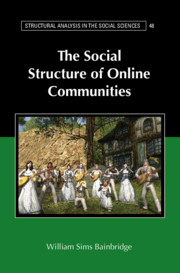Book contents
- The Social Structure of Online Communities
- Structural Analysis in the Social Sciences
- The Social Structure of Online Communities
- Copyright page
- Contents
- Preface
- 1 Introduction
- 2 Facebook
- 3 Virtual Worlds
- 4 Open-Source Software
- 5 Wikis
- 6 Citizen Social Science
- 7 Digital Government
- 8 Cultural Science
- Notes
- Index
- Series page
4 - Open-Source Software
Published online by Cambridge University Press: 06 March 2020
- The Social Structure of Online Communities
- Structural Analysis in the Social Sciences
- The Social Structure of Online Communities
- Copyright page
- Contents
- Preface
- 1 Introduction
- 2 Facebook
- 3 Virtual Worlds
- 4 Open-Source Software
- 5 Wikis
- 6 Citizen Social Science
- 7 Digital Government
- 8 Cultural Science
- Notes
- Index
- Series page
Summary
A main socio-structural distinction, so commonplace that we often do not take it into account in our analysis of a dataset, is the ultimately ambiguous distinction between professional and nonprofessional, or amateur. In Chapter 6 on citizen science, for example, we shall fail to mention George Kelly’s theory of personal science, which can be interpreted to mean that every human being is a psychologist, developing throughout life a distinctive theory of the human mind, supported by empirical observations of events and experimental behavior.
- Type
- Chapter
- Information
- The Social Structure of Online Communities , pp. 99 - 133Publisher: Cambridge University PressPrint publication year: 2020

